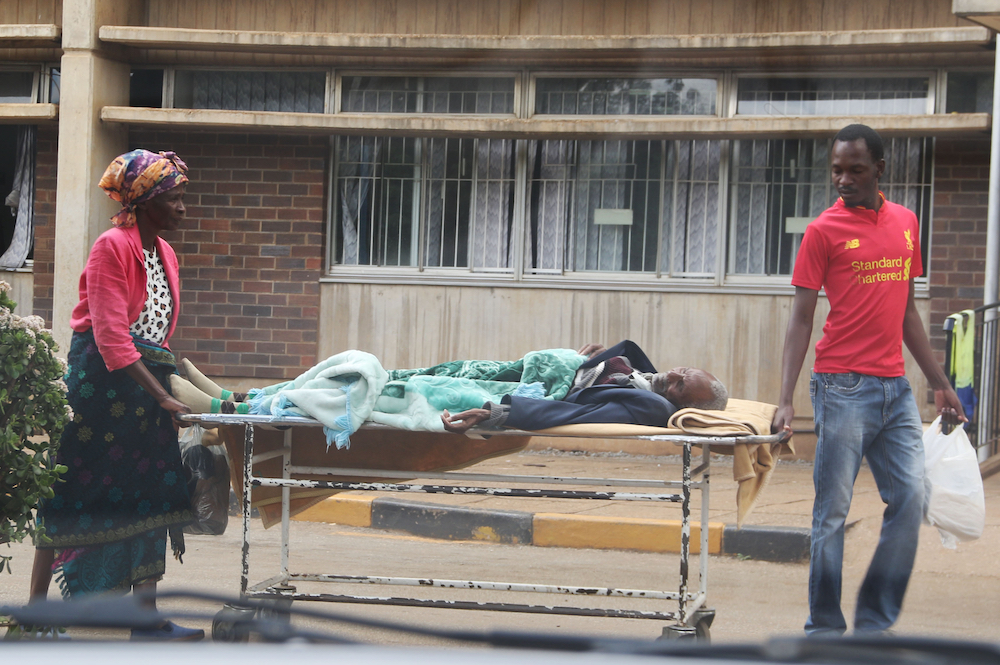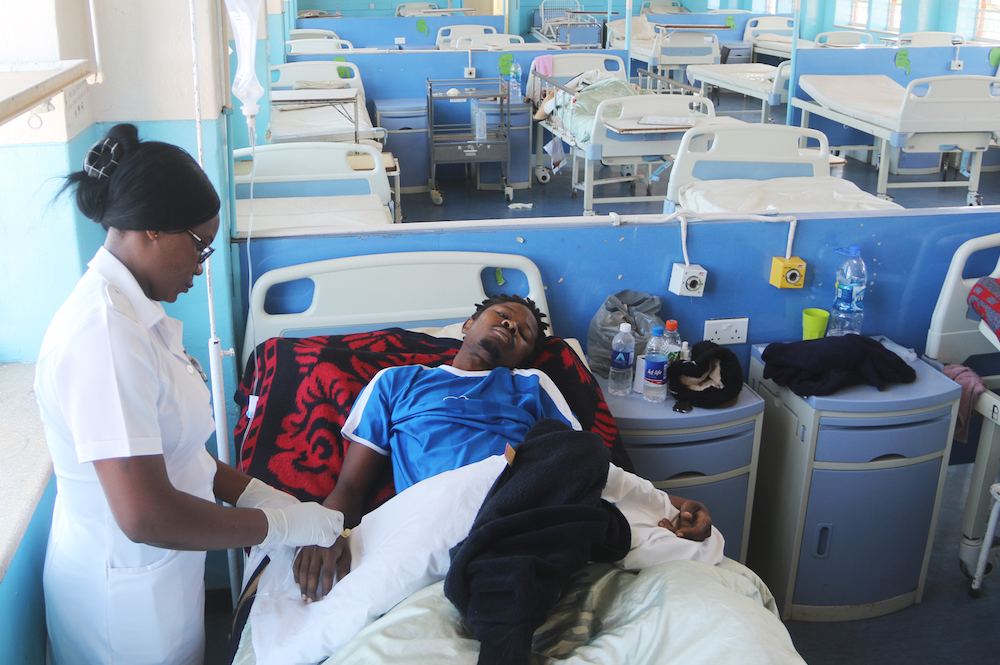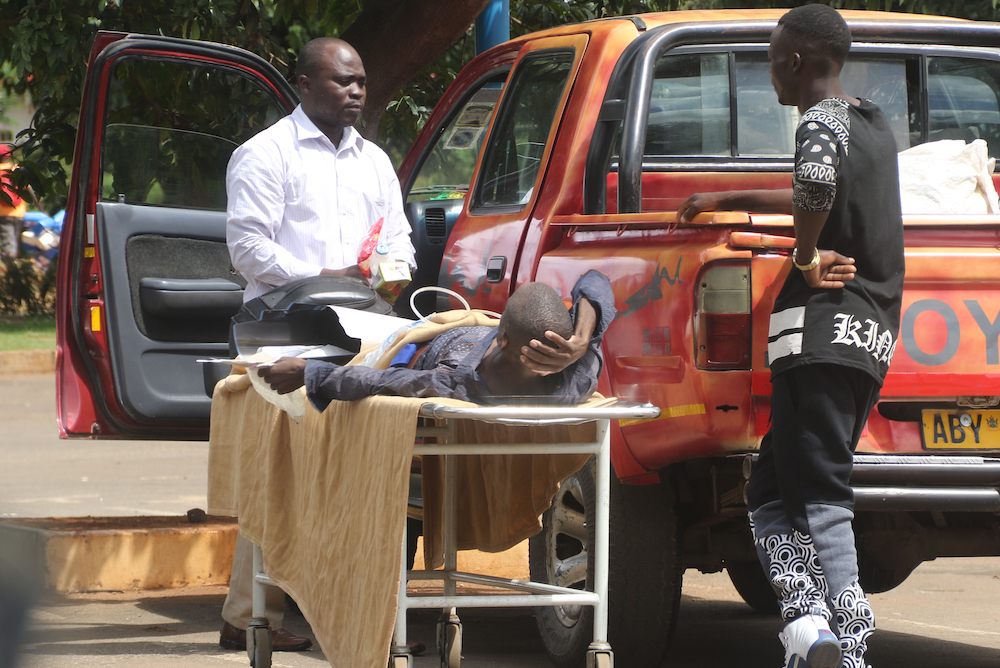
Relatives of a sick man cart him away after being turned away from the main referral Parirenyatwa hospital in Harare as the Zimbabwe doctors' strike persists. (Tawanda Karombo)
Catholic bishops in Zimbabwe are working to salvage a solution to a health care crisis occasioned by a stand-off between the government and striking public hospital doctors that has crippled Zimbabwe's health delivery system, leaving ordinary citizens without access to affordable care.
Zimbabwean junior doctors have gone for more than three months without reporting for work, demanding that the government award them a salary increase to cope with runaway inflation. The doctors have also demanded that the government improve working conditions through ensuring that medicinal supplies and equipment are restored at the public health institutions.
The absence from work by doctors has resulted in patients being turned away from public hospitals, especially those in major urban areas. As a result, patients who cannot afford private health care are now turning to Catholic mission hospitals such as All Souls Mission in Mutoko and St. Paul's Musami Mission in Murehwa, as well as other church-run health institutions.
"We have been turned away; they said there are no doctors and they can't help us," said Hebert Makombami outside the main Parirenyatwa referral hospital in Harare at the beginning of this month.
"My 22-year-old son developed breathing complications three days ago, and it got worse this morning. Now we have to go to All Souls Mission [160 kilometers away from Harare], and that means even more costs for transport," he said.
Private care is not an option for the informal trader who was laid off by a manufacturing company that shut down in 2018. Private doctors charge on average $450 to attend to a patient, and they demand payments in foreign currency. The government of Zimbabwe has acknowledged the burden that has fallen on Catholic mission hospitals who are responding to more patients.
Advertisement
"We are grateful to the work being done by some senior doctors and those working at mission hospitals," Dr. Obadiah Moyo, Zimbabwe's health minister, said at a press conference after a Dec. 3 cabinet meeting here.
Zimbabwe's junior doctors have been striking off and on for two years but now have been on strike for more than 100 consecutive days. Senior doctors also joined the strike at the beginning of December, effectively pulling down the curtain on any hopes that Zimbabweans can access health care at the public hospitals. Until then, the senior doctors had only been attending to emergencies, in the absence of junior doctors, who are key in the daily operations of a big public hospital.\
In a bid to find solutions to the crisis, Catholic bishops have held meetings with the government and with representatives of the striking doctors. Archbishop Robert Ndlovu met in early December with President Emmerson Mnangagwa, whose government has already dismissed about 500 doctors for being absent from work.
After the meeting, Nov. 28 with Ndlovu, Mnangagwa gave the striking and fired doctors a 48-hour moratorium for them to return to work without facing disciplinary consequences.
Ndlovu told journalists after the meeting that they had "discussed a lot about the issue of doctors, the striking doctors," highlighting that the government had resultantly "agreed … to give a moratorium of two days for doctors to report back to work without having to" reapply.
"At least they gave them two days and don't need to re-apply as had been decided by Cabinet," he said.

Wards at the Harare Central Hospital are mostly empty, with only a few emergency cases are being attended to. (Tawanda Karombo)
On Dec. 3, the government announced that only about 47 of the striking doctors had decided to return to work. The next day, the Zimbabwe Senior Hospital Doctors Association marched from Parirenyatwa Hospital to the Parliament Building and presented a petition to Parliament "about the state of the public health system in Zimbabwe" amid expectations that parliamentarians will "play their part" in helping to find a solution to the situation.
The mediation by Catholic bishops in Zimbabwe in the stand-off between striking doctors and the government has not been without criticism. Some doctors feel that the bishops are over-stepping their mandate.
Dr. Anele Bhebhe tweeted that the Catholic bishops should have consulted the doctors first. He also stressed that the striking doctors could not agree to return to work without having their concerns addressed, in spite of the mediation efforts by the Catholic bishops.
"If, Archbishop Robert Ndlovu had consulted us, we could've agreed that a health care crisis of this magnitude cannot be solely solved by a request to doctors to resume work without sorting out their concerns. That labor disputes are only resolved in legal negotiation forums," said Bhebhe.
Wider expectations are on the Catholic bishops to nudge the two parties to a compromise solution to end the crisis. There are concerns from human rights campaigners, opposition and other church leaders that avoidable deaths are occurring owing to the absence of the striking doctors.
Such concerns have pressured Zimbabwean businessman Strive Masiyiwa, who controls the country's biggest telecom operator, Econet, to come up with a rescue package for the striking doctors through his philanthropy organization, Higher Life Foundation. The foundation has offered to pay salaries for the doctors for the next six months and to provide transportation for them to go to work for the same period, in addition to restocking equipment and other medicinal supplies at the public health institutions.

These people were turned away from the Parirenyatwa hospital in Harare, Zimbabwe, because of the doctors' strike. (Tawanda Karombo)
"I'm hoping that churches will join this initiative, and bring whatever they can, to help our health care workers, particularly over the holiday season. It is my hope that the doctors, and their employer, the government, will reach an amicable agreement shortly," said Masiyiwa on Tuesday.
The dire situation in the Zimbabwean public health sector adds to the strain already being suffered by Zimbabweans from hunger and an economic crisis that has been blamed on Mnangagwa's policies.
The Catholic Agency For Overseas Development (CAFOD) of England and Wales said last month that "years of economic turmoil and climate change, as well as the recent Cyclone Idai, are pushing families [in Zimbabwe] to the brink" of starvation.
CAFOD country representative in Zimbabwe, Verity Johnson, said: "The cost of food has risen exponentially, and there are severe bread shortages across the country. Where it can be found, a loaf of bread in Zimbabwe now costs up to 15 times more than it did a year ago."
A prolonged drought "means dams have failed to fill, wells and rivers are drying up, leaving communities with no option but to walk tens of kilometers" to reach water sources. Moreover, last year's harvests failed, largely due to extreme weather, from droughts that lasted for months on end, to flooding which wiped out whole villages, added Johnson.
The United Nations said Dec, 3 that it would make food aid available to about four million Zimbabweans that urgently require immediate food assistance after launching a $355 million appeal for aid for Zimbabwe in August. CAFOD has stepped up with a $65,000 emergency response.
"Through our Church network, we have intensified our efforts over the last few weeks to provide families in need with emergency food and safe, clean water," CAFOD states on its website.
[Tawanda Karombo is a business and financial technology journalist based in Harare, Zimbabwe, with over 10 years of experience covering sub-Saharan Africa.]






